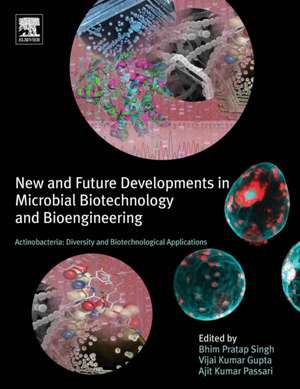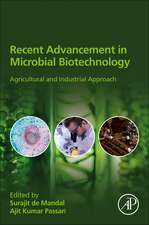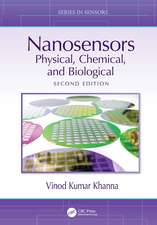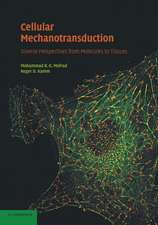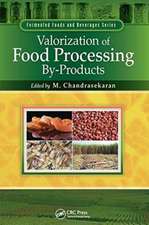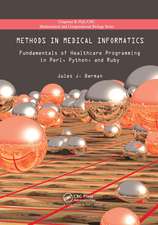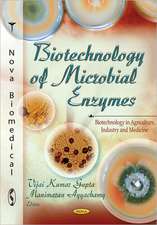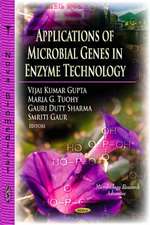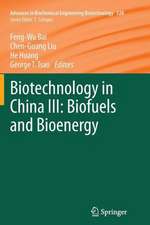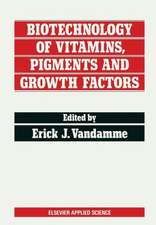Actinobacteria: Diversity and Biotechnological Applications: New and Future Developments in Microbial Biotechnology and Bioengineering
Editat de Bhim Pratap Singh, Vijai Kumar Gupta, Ajit Kumar Passarien Limba Engleză Paperback – 9 feb 2018
- Includes an overview of all types of actinobacteria, source and enzymatic activity
- Lists various bioengineering methods for the production of these enzymes
- Reviews numerous industrial applications of actinobacteria, i.e., crop improvement, removal of heavy metals, etc.
- Offers unique coverage of the application of actinobacteria in bioremediation processes
- Explores the plant growth promoting potential of endophytic actinobacteria
- Describes biosynthetic potential genes associated with actinobacterial genome
Preț: 1048.54 lei
Preț vechi: 1178.15 lei
-11% Nou
Puncte Express: 1573
Preț estimativ în valută:
200.63€ • 209.48$ • 166.05£
200.63€ • 209.48$ • 166.05£
Carte tipărită la comandă
Livrare economică 29 martie-12 aprilie
Preluare comenzi: 021 569.72.76
Specificații
ISBN-13: 9780444639943
ISBN-10: 0444639942
Pagini: 362
Dimensiuni: 216 x 276 mm
Greutate: 0.84 kg
Editura: ELSEVIER SCIENCE
ISBN-10: 0444639942
Pagini: 362
Dimensiuni: 216 x 276 mm
Greutate: 0.84 kg
Editura: ELSEVIER SCIENCE
Public țintă
Researchers and students in biotechnology, biochemical engineering, chemistry/biochemistry in academia, government labs and corporate labs and provides new ideas to the upcoming research students about various biological applications of Kingdom actinobacteria.Cuprins
1. Methods Used for the Recovery of Culturable Endophytic Actinobacteria: An Overview
2. Actinobacteria from Rhizosphere: Molecular Diversity, Distributions, and Potential Biotechnological Applications
3. Molecular Markers Used for Identification and Genomic Profiling of Plant Associated Endophytic Actinobacteria
4. Freshwater Actinobacteria: Potential Source for Natural Product Search and Discovery
5. Actinobacteria: Eco-Friendly Candidates for Control of Plant Diseases in a Sustainable Manner
6. Biocontrol Potential and Applications of Actinobacteria in Agriculture
7. Endophytic Actinobacteria From Native Plants of Algerian Sahara: Potential Agents for Biocontrol and Promotion of Plant Growth
8. Streptomyces in Plant Growth Promotion: Mechanisms and Role
9. Current Status and Applications of Actinobacteria in the Production of Anticancerous Compounds
10. Biotechnological Potential of Thermophilic Actinobacteria Associated With Hot Springs
11. The Role of Actinobacteria in the Production of Industrial Enzymes
12. Characterization of the Genus Sinomonas: From Taxonomy to Applications
13. Actinobacteria: A Highly Potent Source for Holocellulose Degrading Enzymes
14. Metabolic Potential and Biotechnological Importance of Plant Associated Endophytic Actinobacteria
15. Biology of Pathogenic Actinobacteria: Nocardia and Allied Genera
16. Novel Perspectives of Biotic and Abiotic Stress Tolerance Mechanism in Actinobacteria
17. Detection and Expression of Biosynthetic Gene Clusters in Actinobacteria
18. Recent Trends in Biosorption of Heavy Metals by Actinobacteria
19. Antimicrobial Compounds From Actinobacteria: Synthetic Pathways and Applications
20. Bio-Augmentation of Actinobacteria and Their Role in Dye Decolorization
21. Future Prospects of Actinobacteria in Health and Industry
22. Genomics of Actinobacteria With a Focus on Natural Product Biosynthetic Genes
2. Actinobacteria from Rhizosphere: Molecular Diversity, Distributions, and Potential Biotechnological Applications
3. Molecular Markers Used for Identification and Genomic Profiling of Plant Associated Endophytic Actinobacteria
4. Freshwater Actinobacteria: Potential Source for Natural Product Search and Discovery
5. Actinobacteria: Eco-Friendly Candidates for Control of Plant Diseases in a Sustainable Manner
6. Biocontrol Potential and Applications of Actinobacteria in Agriculture
7. Endophytic Actinobacteria From Native Plants of Algerian Sahara: Potential Agents for Biocontrol and Promotion of Plant Growth
8. Streptomyces in Plant Growth Promotion: Mechanisms and Role
9. Current Status and Applications of Actinobacteria in the Production of Anticancerous Compounds
10. Biotechnological Potential of Thermophilic Actinobacteria Associated With Hot Springs
11. The Role of Actinobacteria in the Production of Industrial Enzymes
12. Characterization of the Genus Sinomonas: From Taxonomy to Applications
13. Actinobacteria: A Highly Potent Source for Holocellulose Degrading Enzymes
14. Metabolic Potential and Biotechnological Importance of Plant Associated Endophytic Actinobacteria
15. Biology of Pathogenic Actinobacteria: Nocardia and Allied Genera
16. Novel Perspectives of Biotic and Abiotic Stress Tolerance Mechanism in Actinobacteria
17. Detection and Expression of Biosynthetic Gene Clusters in Actinobacteria
18. Recent Trends in Biosorption of Heavy Metals by Actinobacteria
19. Antimicrobial Compounds From Actinobacteria: Synthetic Pathways and Applications
20. Bio-Augmentation of Actinobacteria and Their Role in Dye Decolorization
21. Future Prospects of Actinobacteria in Health and Industry
22. Genomics of Actinobacteria With a Focus on Natural Product Biosynthetic Genes
